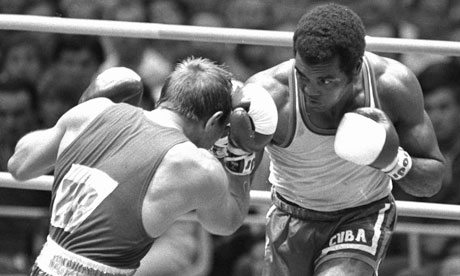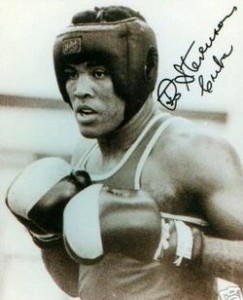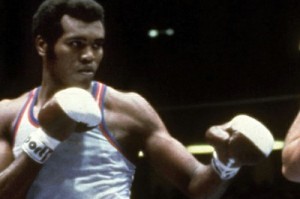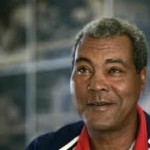
Teófilo Stevenson, right, takes on Soviet opponent Pyotr Zaev to win the heavyweight bout at the Moscow Olympics in 1980. Photograph: AP
Boxing holds a special place in the hearts of Cubans, and after Castro banned professional sports in the early 1960s, the country quickly became a dominant power in the amateur rings. Their biggest star was the heavyweight Teófilo Stevenson, who has died after suffering from heart disease aged 60. Stevenson was the second boxer, after the Hungarian László Papp, and the first heavyweight, to become a three-time Olympic gold medallist. (His fellow Cuban heavyweight Félix Savón has since accomplished the same feat.)
Stevenson was born on March 29, 1952 in Cuba’s eastern Las Tunas province. His father was an immigrant from Saint Vincent; his mother was a first-generation Cuban whose parents had come from Saint Kitts. Big for his age, and otherwise seemingly unfocused, he began sparring seriously at nine and by his early teens, coached by John Herrera, had won his first junior title.
Soon he was training in Havana under the Soviet coach Andrei Chervonenko, who began teaching him the style perfected in eastern Europe to take advantage of amateur scoring, which counted all punches landed equally. Combined with the more professional style he had already learned, Stevenson quickly established himself. He lost in the national finals at 17 and won bronze at the Pan American Games in 1971, after losing to the highly touted American Duane Bobick.
At the 1972 Munich Olympics, Stevenson and Bobick met in the quarter-finals, in what was probably the greatest fight of Stevenson’s career. The fight went into the decisive third round, and he won after putting Bobick down three times. Stevenson then easily won his semi-final, and he took the gold when Romania’s Ion Alexe withdrew due to injury. This began Stevenson’s unprecedented run of domination in the amateur ranks. He won the 1974 World Championships before a wildly partisan crowd in Havana and the 1975 Pan American Games in Mexico City before his Olympic victory in Montreal. These were heady times for Cuban sport – Stevenson and the athlete Alberto Juantorena were arguably the biggest stars of the 1976 Olympics.
Stevenson’s only losses during this time came in dual meets with the Soviets, in 1973 and 1976, to Igor Vysotsky, but he won further World, Pan American and Olympic titles, the latter achieved in Moscow in 1980. His streak ended at the 1982 World Championships, with a loss to Italy’s Francesco Damiani, but he would likely have won a fourth Olympic gold had Cuba not boycotted the 1984 Games in Los Angeles following Soviet Union action; Stevenson had beaten Tyrell Biggs, who won the Olympic gold, in a Cuba-US dual meet before the Games.
Stevenson won the 1986 World title at super-heavyweight, but retired in 1988 after another Cuban boycott following Soviet Union action – this time of the Seoul Olympics – cost him another chance for a fourth gold. He ended his career with 302 wins and only 22 losses. Stevenson then lived in relative luxury in Havana after he turned down a potential million-dollar payday for a fight against Muhammad Ali, which would have been billed as an epic confrontation between American democracy and Soviet-style communism. Teofilo Stevenson was just a victim of the Cold War confrontation as Castro’s Administration forced the nation to follow URSS interests.
He became a coach with the national team, and rose to the vice-presidency of the national boxing federation. It was while travelling with the national team from a match against the US in 1999 that he was arrested at Miami airport, accused of headbutting an airline employee. Released on bail, he returned to Havana, and never faced trial, but said that he had been provoked by Cuban exiles in Miami, because he was an internationally successful Cuban sports figure.
In January this year, Stevenson was hospitalised with a blood clot. He was gladdened by the outpouring of support he received from around the globe – “even from Miami,” he said. He died June 11, 2012. He is survived by two children.
Sources: Wiki/CarsonUK/Varona/InternetPhotos/TheCubanHistory.com
Distinguisded Athlete dies, another victim of the Cold War/The Cuban History/Arnoldo Varona, Editor
MUERE DISTINGUIDO ATLETA, OTRA VICTIMA DE LA GUERRA FRIA

Teófilo Stevenson, derecha, arremete contra su oponente Soviético Piotr Zaev para ganar la pelea de peso pesado en los Juegos Olímpicos de Moscú en 1980. Foto: AP
Boxeo tiene un lugar especial en los corazones de los cubanos, y después de Castro prohibió el deporte profesional a principios de 1960, el país se convirtió rápidamente en una potencia dominante en los anillos de aficionados. Su estrella más grande era el peso pesado Teófilo Stevenson, que ha muerto después de sufrir de enfermedades del corazón de 60 años. Stevenson fue el segundo boxeador, después de que el húngaro Laszlo Papp, y el primer peso pesado, para convertirse en un tres veces medallista de oro olímpica. (Su compañero de peso pesado cubano Félix Savón desde entonces ha logrado la misma hazaña.)
Stevenson nació el 29 de marzo de 1952 en el este de Cuba de la provincia de Las Tunas. Su padre era un inmigrante de San Vicente, su madre era un cubano de primera generación cuyos padres habían venido de San Cristóbal. Grande para su edad, y otra parte, aparentemente fuera de foco, que comenzó en serio combate a las nueve y por su temprana adolescencia, dirigido por Juan de Herrera, había ganado su título junior en primer lugar.
Pronto él estaba entrenando en La Habana bajo la soviética Andrei Chervonenko el entrenador, quien comenzó a enseñarle el estilo perfeccionado en Europa del Este para aprovechar de la calificación de aficionados, que contó con todos los golpes conectados por igual. En combinación con el estilo más profesional que ya había aprendido, Stevenson se estableció rápidamente. Él perdió en las finales nacionales en 17 y ganó el bronce en los Juegos Panamericanos en 1971, después de perder ante el muy promocionado estadounidense Duane Bobick.
En los Juegos Olímpicos de Munich en 1972, Stevenson y Bobick se reunieron en los cuartos de final, en lo que probablemente fue la mejor pelea de la carrera de Stevenson. La lucha se fue a la tercera ronda decisiva, y ganó después de poner Bobick hasta tres veces. Stevenson entonces fácilmente ganó su semifinal, y se llevó el oro en Rumania Ion Alexe se retiró debido a una lesión. Esto comenzó racha sin precedentes de Stevenson de la dominación en las filas de aficionados. Ganó el Campeonato Mundial de 1974 ante una multitud violentamente partidista en La Habana y los Juegos Panamericanos de 1975 en Ciudad de México antes de su victoria olímpica en Montreal. Eran tiempos gloriosos para el deporte cubano – Stevenson y el atleta Alberto Juantorena fueron sin duda las más grandes estrellas de los Juegos Olímpicos de 1976.
Únicamente las pérdidas de Stevenson durante este tiempo se produjo en dos cumple con los soviéticos, en 1973 y 1976, a Igor Vysotsky, pero ganó Mundial más lejos, Pan American y títulos olímpicos, el último logrado en Moscú en 1980. Su racha terminó en el Campeonato del mundo de 1982, con una derrota ante el italiano Francesco Damiani, pero probablemente habría ganado un cuarto oro olímpico si no se hubiera Castro unido al boicott, siguiendo los pasos de la Union Sovietica en los Juegos de 1984 en Los Ángeles; Stevenson habría derrotado a Tyrell Biggs, quien ganó el oro olímpico, en un encuentro Cuba-Estados Unidos doble antes de los Juegos.
Stevenson ganó el título Mundial de 1986 en el súper peso pesado, pero se retiró en 1988 después de un nuevo boicot de Castro, otra vez siguiendo los pasos de la Union Sovietica – en esta ocasión de los Juegos Olímpicos de Seúl – le costó una nueva oportunidad para una cuarta medalla de oro. Terminó su carrera con 302 victorias y sólo 22 pérdidas. Stevenson entonces vivió en relativo lujo en La Habana después de haber rechazado un potencial de millones de dólares el día de pago para una pelea contra Muhammad Ali, lo que hubiera sido calificada como una confrontación épica entre la democracia americana y el comunismo de estilo soviético. Teófilo Stevenson no fue mas que una victima mas en la confrontación de la Guerra Fría cuando la Administracion de Castro siguió los intereses de la URSS, intereses muy ajenos a las realidades cubanas.
Entonces se convirtió en un entrenador con el equipo nacional, y se le nombró a la vice-presidencia de la federación nacional de boxeo. Fue durante el viaje con el equipo nacional de un partido contra los EE.UU. en 1999, que fue detenido en el aeropuerto de Miami, acusado de un cabezazo a empleado de la aerolínea. Liberado bajo fianza, regresó a La Habana, y nunca enfrentó juicio, pero dijo que había sido provocada por los exiliados cubanos en Miami, porque él era una figura cubana de éxito internacional en deportes. Un episodio que fué aprovechado por Castro para explotar la división entre los cubanos a su beneficio.
En enero de este año, Stevenson fue hospitalizado con un coágulo de sangre. Él se alegró por el gran apoyo que recibió de todo el mundo – “incluso de Miami”, dijo. Murió 11 de junio 2012. Le sobreviven dos hijos.
Sources: Wiki/CarsonUK/Varona/InternetPhotos/TheCubanHistory.com
Distinguisded Athlete dies, another victim of the Cold War/The Cuban History/Arnoldo Varona, Editor



 Distinguished Athlete Dies, Another Victim of The Cold War
Distinguished Athlete Dies, Another Victim of The Cold War


